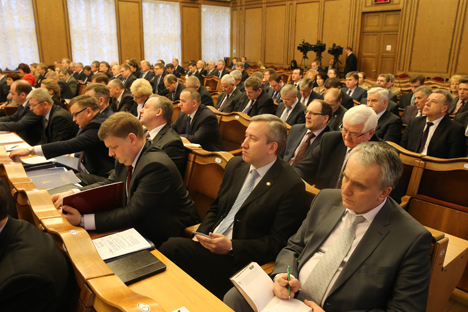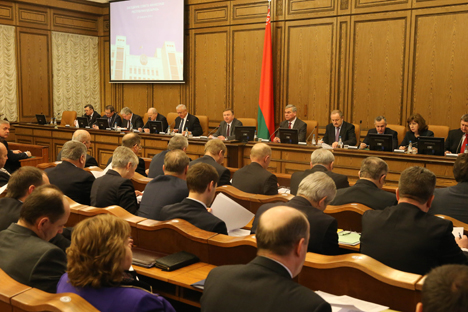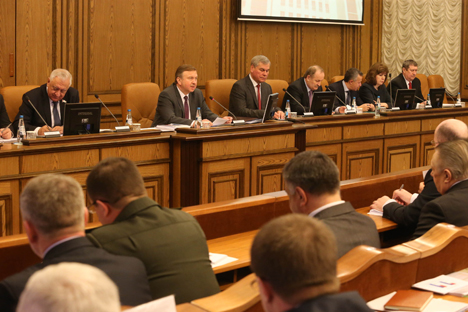Events
Kobyakov urges to tap into internal economic reserves, mobilize personnel
MINSK, 20 February (BelTA) -We need to tap into internal reserves and mobilize personnel in order to develop the economy, Belarus’ Prime Minister Andrei Kobyakov said when speaking at the meeting of the Council of Ministers to discuss the social and economic development of the Republic of Belarus in 2015, BelTA has learned.
“We need to tap into our internal reserves and mobilize the personnel in order to address the issues of economic development,” noted Andrei Kobyakov.
 Andrei Kobyakov outlined the main tasks for the government, ministers, heads of the concerns and local authorities. “The main task is to build up exports and promote rational import-substitution securing balanced foreign trade. Secondly, we need to cut costs and reduce the backlog of inventory,” he said. Besides, he demanded strict personnel and production discipline, liberalization of business initiative.
Andrei Kobyakov outlined the main tasks for the government, ministers, heads of the concerns and local authorities. “The main task is to build up exports and promote rational import-substitution securing balanced foreign trade. Secondly, we need to cut costs and reduce the backlog of inventory,” he said. Besides, he demanded strict personnel and production discipline, liberalization of business initiative.
“Our main reserve is the personnel, their determination, readiness to work, and self-discipline,” stressed Andrei Kobyakov.
 In his words, all the decisions have been adopted; all the tasks and key efficiency indicators have been outlined. “We need the targets set for companies and include the abovementioned tasks in business plans,” he added.
In his words, all the decisions have been adopted; all the tasks and key efficiency indicators have been outlined. “We need the targets set for companies and include the abovementioned tasks in business plans,” he added.
Andrei Kobyakov said that the year 2015 showed high dependence of the Belarusian economy on the external raw materials markets which largely influenced the year-end results. Only four out of nine key forecast parameters were met. These are the consumer price index, the GDP energy intensity, the margin on sales in the industry, and the foreign trade balance. The country failed to meet the targets on the GDP growth, housing construction with the state support, labor productivity, exports and household incomes.
 Andrei Kobyakov named the foreign trade balance and trade surplus of $205 million among the successes of the previous year. “The country reached such results twice before 2015: in 2005 and 2012,” he stressed.
Andrei Kobyakov named the foreign trade balance and trade surplus of $205 million among the successes of the previous year. “The country reached such results twice before 2015: in 2005 and 2012,” he stressed.
The country’s balance of payments improved. The current account deficit in January-November 2015 reduced by approximately $2.4 billion in comparison with the same period in 2014 (from 5.8% to 3.1% of GDP).
“A tough monetary policy, a flexible foreign exchange rate, and a control over money supply helped keep inflation within the preset target: the increase in prices made up 12%. It is the smallest growth over the last five years,” said Andrei Kobyakov. Stability on the consumer market was also secured. Interest rates on loans reduced alongside the decreasing inflation. “Over the year the interest rate on new loans in the national currency (without taking into account concessional loans) went down by almost 10% from 43.5% per annum in January 2015 to 34.2% per annum in January 2016,” the Prime Minister noted. At the same time he emphasized that reducing interest rates on new loans remains one of the most important tasks in the country’s economy.
Andrei Kobyakov also spoke about the 2015 failures. “When compared with 2014 the industrial and agricultural production shrank in 2015. So did the construction and trade. We have serious questions to the work of the ministries,” he said. In 2015 the Construction and Architecture Minsitry met only one of 14 targets, the Industry Ministry 2 of 12, the Agriculture and Food Ministry and Bellesbumprom forestry concern 2 of 10. “Bellegprom light industry concern failed to meet a single target,” the Prime Minister noted.
A similar situation is in the regions. Only Mogilev Oblast fulfilled half of targets. “Other regions and the city of Minsk cannot boast such results. Grodno Oblast met only a quarter of the targets,” he said.
At the beginning of 2016 the external markets continued to shrink. In January, the price per barrel dropped below $28. The currencies of Belarus’ major trading partners are weakening following oil prices, which affects the mutual trade. According to Andrei Kobyakov, in such circumstances, the overall trend remains: the demand for sophisticated, investments products is falling. “If these trends remain in place in 2016 we will be forced to take proactive steps towards fiscal consolidation,” Andrei Kobyakov said.







 print version
print version make home page
make home page add to bookmarks
add to bookmarks

